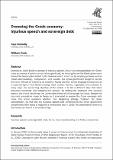Files in this item
Drowning the Greek economy : injurious speech and sovereign debt
Item metadata
| dc.contributor.author | Donnelly, Faye | |
| dc.contributor.author | Vlcek, William | |
| dc.date.accessioned | 2017-11-13T15:30:11Z | |
| dc.date.available | 2017-11-13T15:30:11Z | |
| dc.date.issued | 2017-10-30 | |
| dc.identifier | 251504834 | |
| dc.identifier | 6ee97665-536b-4eb3-b2ac-037819d4a17c | |
| dc.identifier.citation | Donnelly , F & Vlcek , W 2017 , ' Drowning the Greek economy : injurious speech and sovereign debt ' , Finance and Society , vol. 3 , no. 1 , pp. 51-71 . https://doi.org/10.2218/finsoc.v3i1.1938 | en |
| dc.identifier.issn | 2059-5999 | |
| dc.identifier.other | ORCID: /0000-0001-8647-5258/work/58055326 | |
| dc.identifier.other | ORCID: /0000-0002-5499-2899/work/78204930 | |
| dc.identifier.uri | https://hdl.handle.net/10023/12070 | |
| dc.description.abstract | Drawing on Judith Butler’s concept of injurious speech, this article conceptualises the ‘Grexit’ crisis as a series of performances. More specifically, we investigate how the Greek government framed the bailout plans tabled by the Troika as a form of torture. By adopting phrases such as ‘fiscal water-boarding’, ‘asphyxiation’, and ‘suicide’, the Syriza government sought to narrate the harm inflicted on Greece by its creditors. Paying attention to this language is important as it casts new light on how Greek sovereign debt has been framed, negotiated, and contested. In many ways, the overarching objective of this article is to tell a different story that takes discursive transitivity and restaging into account. By shifting the emphasis onto injurious speech, the article also brings the unintended effects of this language into focus. Despite the recurrent accusations made by Syriza as it attempted to resolve the Greek sovereign debt crisis, this article questions whether their bargaining strategy ‘misfired’. On closer consideration, we find that the injurious speech acts performed by the Syriza government compromised their ability to negotiate a third bailout deal in 2015. The observations remind us that words can wound in ambivalent ways. | |
| dc.format.extent | 929539 | |
| dc.language.iso | eng | |
| dc.relation.ispartof | Finance and Society | en |
| dc.subject | Injurious speech | en |
| dc.subject | Sovereign debt crisis | en |
| dc.subject | Syriza | en |
| dc.subject | Fiscal waterboarding | en |
| dc.subject | The Troika | en |
| dc.subject | Compromise | en |
| dc.subject | JZ International relations | en |
| dc.subject | JN Political institutions (Europe) | en |
| dc.subject | HB Economic Theory | en |
| dc.subject | HG Finance | en |
| dc.subject | T-NDAS | en |
| dc.subject | BDC | en |
| dc.subject | R2C | en |
| dc.subject | SDG 3 - Good Health and Well-being | en |
| dc.subject | SDG 16 - Peace, Justice and Strong Institutions | en |
| dc.subject.lcc | JZ | en |
| dc.subject.lcc | JN | en |
| dc.subject.lcc | HB | en |
| dc.subject.lcc | HG | en |
| dc.title | Drowning the Greek economy : injurious speech and sovereign debt | en |
| dc.type | Journal article | en |
| dc.contributor.institution | University of St Andrews. School of International Relations | en |
| dc.contributor.institution | University of St Andrews. Centre for Global Law and Governance | en |
| dc.identifier.doi | 10.2218/finsoc.v3i1.1938 | |
| dc.description.status | Peer reviewed | en |
This item appears in the following Collection(s)
Items in the St Andrews Research Repository are protected by copyright, with all rights reserved, unless otherwise indicated.

